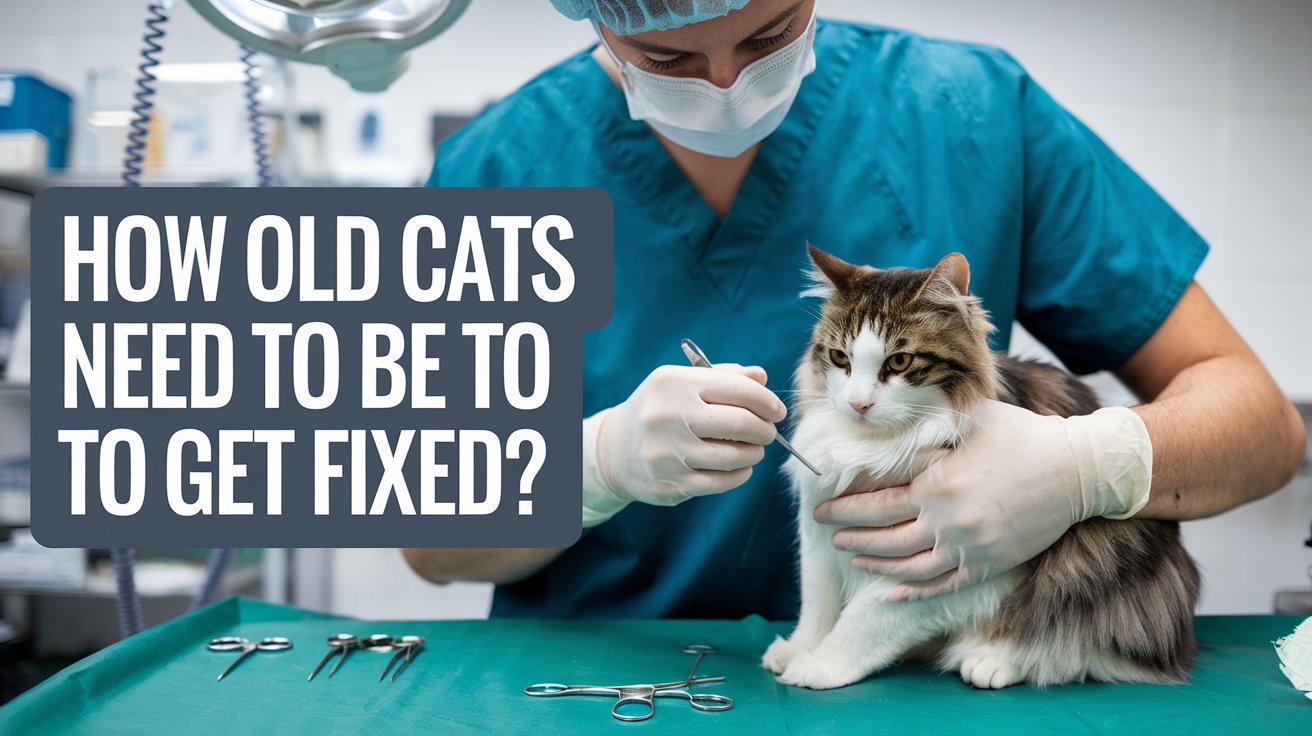
How Old Do Cats Need to Be to Get Fixed? Best Age for Spaying and Neutering
One of the most important decisions you’ll make as a cat owner is determining when your pet is spayed or neutered. These procedures prevent unwanted litter, reduce problematic behaviors, and contribute to your cat’s long-term health. But the question many owners ask is: how old do cats need to be to get fixed?
Veterinarians generally recommend that cats be spayed or neutered when they are about five to six months old, although the ideal age can vary depending on individual factors such as the cat’s breed, health, and environment.
When Is the Best Time to Spay or Neuter a Cat?
The most common recommendation for fixing a cat is around five to six months of age. At this age, kittens are typically old enough to handle the surgery safely, yet young enough to avoid the onset of behaviors associated with sexual maturity, such as territorial marking or yowling. However, recent trends and studies have led to more veterinarians advocating for early-age spay and neuter procedures, which can be done when kittens are as young as eight weeks old.
Benefits of Early-Age Spaying and Neutering
Fixing cats earlier, typically between eight weeks and three months, offers several benefits, including:
- Preventing early pregnancies: Cats can become sexually mature as early as four to five months, meaning that waiting too long increases the risk of unwanted pregnancies.
- Reduced risk of behavioral issues: Early spaying and neutering can prevent aggressive or territorial behaviors from developing.
- Faster recovery: Younger kittens generally recover more quickly from the surgery than older cats, as they have a faster healing response.
While early-age fixing is increasingly common, it’s important to ensure the kitten is healthy and weighs at least two pounds to undergo the procedure safely.
Factors That Can Influence the Best Age to Fix a Cat
The recommended age for spaying or neutering can vary depending on several factors, including:
- Breed: Larger cat breeds, such as Maine Coons, may mature more slowly than smaller breeds, which could influence the timing of the surgery.
- Health: If a kitten has underlying health conditions, your vet might recommend delaying the procedure until they are strong enough to handle it.
- Shelter policies: Many animal shelters neuter and spay cats before adoption, often opting for early-age fixing to prevent population control issues.

The Health Benefits of Spaying and Neutering Cats
Fixing your cat doesn’t just help control the pet population; it also offers numerous health benefits. For female cats, spaying reduces the risk of uterine infections and mammary cancer, while neutering male cats decreases the likelihood of testicular cancer and prostate issues. Additionally, neutered males are less likely to roam or get into fights, reducing their chances of being injured or contracting diseases such as feline immunodeficiency virus (FIV) and feline leukemia virus (FeLV).
How Spaying and Neutering Reduces Behavioral Problems
Spaying and neutering can also curb many of the undesirable behaviors associated with sexual maturity. Male cats, for example, may spray urine to mark their territory or become aggressive toward other animals. Neutering often eliminates these behaviors or significantly reduces their frequency.
For females, spaying helps avoid the heat cycle, which can be stressful for both the cat and the owner. Cats in heat can be extremely vocal, restless, and may try to escape to find a mate.
When to Wait: Special Cases Where Delaying the Procedure May Be Necessary
While spaying and neutering are highly recommended for all cats, there are instances where it might be necessary to delay the procedure. For example:
- Underweight kittens: If your kitten is under two pounds, your veterinarian may suggest waiting until they have gained enough weight to safely undergo the surgery.
- Health issues: If your cat has a chronic illness or is recovering from an infection, surgery may need to be postponed.
- Breeding cats: If you plan on breeding your cat, you will need to wait until after they’ve produced a litter before spaying or neutering.
Post-Surgery Care: What to Expect After Your Cat Is Fixed
After your cat is spayed or neutered, proper post-operative care is essential to ensure a smooth recovery. Here are a few key points to keep in mind:
Immediate Care After Surgery
- Monitor the incision site: Check the incision area for any signs of swelling, redness, or discharge. Keep the area clean and dry to avoid infection.
- Minimize activity: For a few days after surgery, keep your cat indoors and restrict their movement. Avoid letting them jump or play too vigorously to allow the incision to heal properly.
- Use an Elizabethan collar: If your cat tries to lick or chew the incision site, consider using an Elizabethan collar (or “cone”) to prevent this behavior, which can cause irritation or infection.
Diet and Hydration
- Small meals: Your cat may feel nauseous after surgery, so it’s best to offer small, easy-to-digest meals. Keep them hydrated by providing fresh water at all times.
- Avoid overfeeding: Fixed cats can become prone to weight gain, so monitor their food intake and adjust their diet if necessary to maintain a healthy weight.
Follow-up With the Vet
- Post-op checkup: Schedule a follow-up visit with your veterinarian to ensure your cat is healing properly. Your vet may remove any sutures and ensure the incision site has closed fully.

Common FAQs About Spaying and Neutering Cats
Is there a difference in recovery time between males and females?
Yes, female cats typically undergo more invasive surgery, so their recovery time may be slightly longer than that of males. However, both usually recover fully within a week to ten days.
Can a cat be spayed or neutered while in heat?
Yes, but it’s generally better to wait until the heat cycle is over, as the surgery can be more complicated and may result in increased bleeding.
Will fixing my cat make them overweight?
While neutering does lower a cat’s metabolic rate, it doesn’t directly cause weight gain. Feeding a balanced diet and encouraging exercise will keep your cat at a healthy weight.
What happens if I don’t fix my cat?
Unspayed females are at higher risk for certain cancers and infections. Unneutered males are more likely to roam, get into fights, and mark their territory with urine.
Is it ever too late to spay or neuter a cat?
While earlier is better, cats can be spayed or neutered at almost any age, provided they are in good health.
How long does it take for a cat to recover from spaying or neutering?
Most cats recover from spaying or neutering within 7 to 10 days. Younger cats may heal more quickly, while older cats may take a bit longer.
Conclusion
The question of how old cats need to be fixed depends on various factors like the cat’s health, breed, and personal circumstances. Generally, five to six months is the recommended age, but early-age spaying or neutering is also widely practiced, especially in shelters. Ensuring your cat is fixed not only helps control the cat population but also offers health benefits and curbs undesirable behaviors. Whether you opt for the traditional timeline or early-age fixing, consulting with your veterinarian is the best way to determine the right time for your furry friend.

I am a dedicated writer and expert in cats, with years of experience studying feline behavior, health, and breeds. Passionate about sharing my knowledge, I provide valuable insights and practical advice to help cat lovers understand and care for their furry companions. When not writing, I enjoy spending time with my beloved cats, continually learning and deepening my expertise.



















